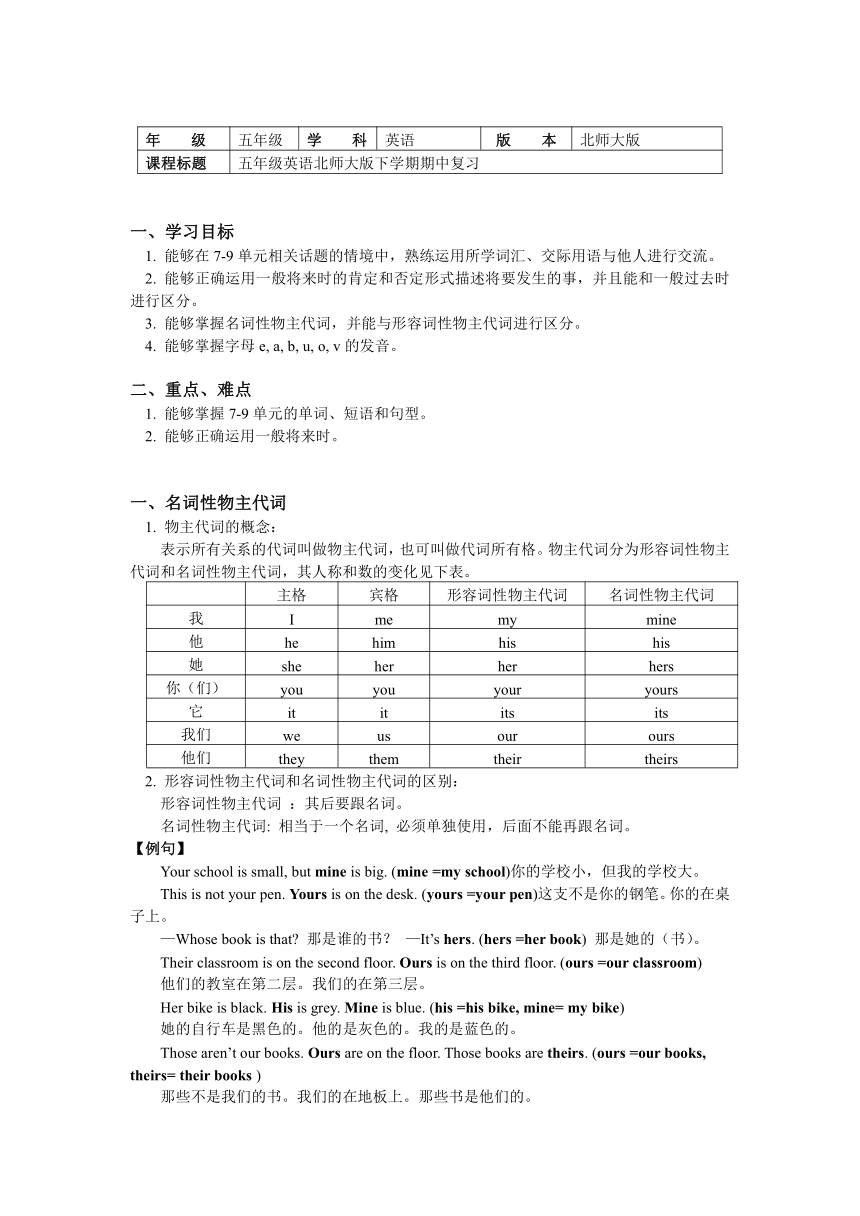
年 级 五年级 学 科 英语 版 本 北师大版 课程标题 五年级英语北师大版下学期期中复习 一、学习目标 1. 能够在7-9单元相关话题的情境中,熟练运用所学词汇、交际用语与他人进行交流。 2. 能够正确运用一般将来时的肯定和否定形式描述将要发生的事,并且能和一般过去时进行区分。 3. 能够掌握名词性物主代词,并能与形容词性物主代词进行区分。 4. 能够掌握字母e, a, b, u, o, v的发音。 二、重点、难点 1. 能够掌握7-9单元的单词、短语和句型。 2. 能够正确运用一般将来时。 一、名词性物主代词 1. 物主代词的概念: 表示所有关系的代词叫做物主代词,也可叫做代词所有格。物主代词分为形容词性物主代词和名词性物主代词,其人称和数的变化见下表。 主格 宾格 形容词性物主代词 名词性物主代词 我 I me my mine 他 he him his his 她 she her her hers 你(们) you you your yours 它 it it its its 我们 we us our ours 他们 they them their theirs 2. 形容词性物主代词和名词性物主代词的区别: 形容词性物主代词 :其后要跟名词。 名词性物主代词: 相当于一个名词, 必须单独使用,后面不能再跟名词。 【例句】 Your school is small, but mine is big. (mine =my school)你的学校小,但我的学校大。 This is not your pen. Yours is on the desk. (yours =your pen)这支不是你的钢笔。你的在桌子上。 —Whose book is that? 那是谁的书? —It’s hers. (hers =her book) 那是她的(书)。 Their classroom is on the second floor. Ours is on the third floor. (ours =our classroom) 他们的教室在第二层。我们的在第三层。 Her bike is black. His is grey. Mine is blue. (his =his bike, mine= my bike) 她的自行车是黑色的。他的是灰色的。我的是蓝色的。 Those aren’t our books. Ours are on the floor. Those books are theirs. (ours =our books, theirs= their books ) 那些不是我们的书。我们的在地板上。那些书是他们的。 【即学即练】 一、用名词性物主代词表示下列短语: 1. her book_____ 2. his pencil_____ 3. their bags_____ 4. your suitcase_____ 5. my house_____ 6. our backpacks_____ 二、翻译句子: 1. 这是他的毛衣,我的在我房间里。 _____ 2. 这些是他们的机器人,我们的在地板上。 _____ 3. 那个是你的收音机,她的在桌子上。 _____ 4. 那些是我们的铅笔,你们的在铅笔盒里。 _____ 答案: 一、1. hers 2. his 3. theirs 4. yours 5. mine 6. ours 二、 1. This is his sweater. Mine is in my room. 2. These are their robots. Ours are on the floor. 3. That is your radio. Hers is on the table. 4. Those are our pencils. Yours are in the pencil-box. 二、一般将来时 1. 概念: 一般将来时表示将来某一时刻的动作或状态,或将来某一段时间内经常性的动作或状态,常和表示将来的时间状语连用。如:tomorrow(明天), next week(下周), from now on(从现在开始),in the future(将来)等。 一般将来时由助动词shall(第一人称),will(第二、三人称)加动词原形构成。美式英语则不管什么人称,一律用will。 2. 基本句型: 肯定句:I/We shall/will go. You/He/She/They will go. 否定句:I/We shall/will not go. You/He/She/They will not go. 一般疑问句:Shall I/we go? Will you/he/she/they go? 简略回答:(肯)Yes,主语+shall/will. (否) No, 主语 +shall/will not. 3. 特殊疑问句:一般将来时的特殊疑问句是将特殊疑问词放在句首,后接一般疑问句(就主语提问时,以疑问词who开头的疑问句除外) 4. 注意: will 常简略为 'll,并与主语连写在一起,如:I'll, sh ... ...
~~ 您好,已阅读到文档的结尾了 ~~

